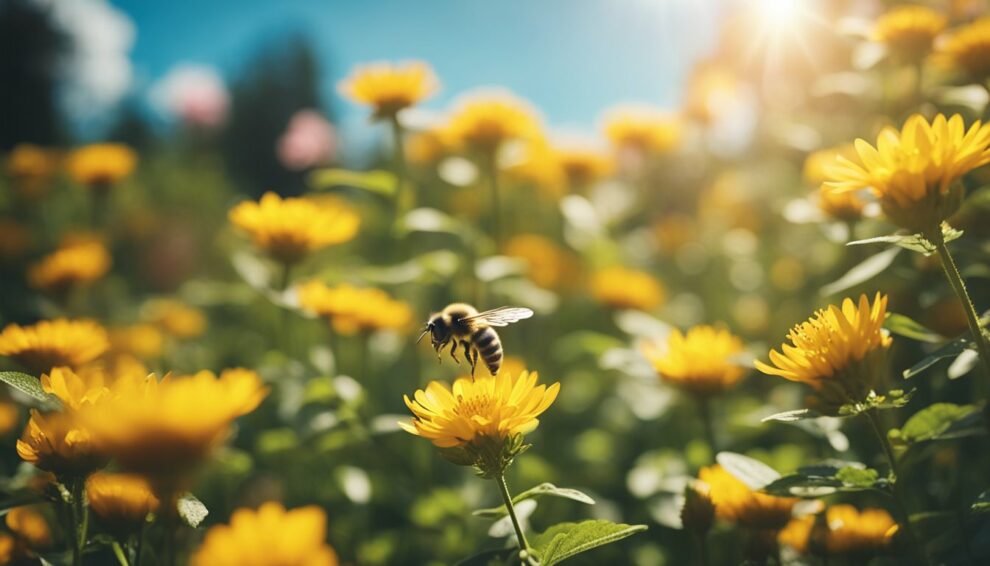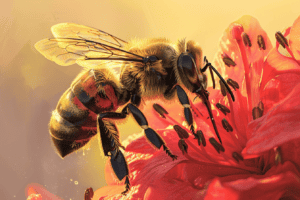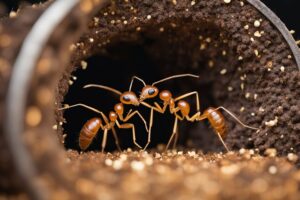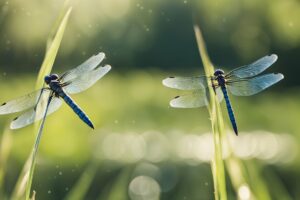Bees are fascinating creatures that play a crucial role in our planet’s ecosystem.
They are responsible for pollinating the plants that produce the food we eat, and without them, our world would be a very different place.
In fact, according to the United Nations’ Food and Agriculture Organization, bees are responsible for pollinating 71 of the 100 crops that provide 90% of the world’s food supply.

Pollination is the process by which bees transfer pollen from the male part of a flower to the female part, allowing the plant to produce seeds and fruit.
This process is essential for the reproduction of many plants, and without it, these plants would not be able to survive.
Bees are not the only pollinators in the world, but they are by far the most important.
They are responsible for pollinating a wide variety of plants, from crops like almonds and apples to wildflowers and trees.
The importance of bees to our environment cannot be overstated.
They are not only responsible for pollinating our food supply, but they also play a vital role in maintaining the balance of our planet’s ecosystem.
Without bees, many animals would lose their primary source of food, and entire ecosystems would be disrupted.
It is essential that we protect these amazing creatures and ensure that they continue to thrive in the years to come.
The Busy Lives of Bees
Bees are some of the most hardworking creatures on the planet.
They are constantly buzzing around, collecting nectar and pollen, and making honey to sustain their hives.
In this section, we will explore the fascinating lives of bees and learn about their crucial role in our ecosystem.
The Role of Bees in Pollination
One of the most important jobs that bees have is pollinating plants. When bees land on flowers to collect nectar, they also collect pollen on their bodies.
As they move from flower to flower, they transfer pollen to the female parts of the plants, allowing them to produce seeds and fruit.
Without bees, many of the fruits and vegetables that we enjoy would not exist.
Did you know that honeybees are not the only bees that are important for pollination?
Bumblebees and wild bees also play a crucial role in pollinating plants.
In fact, some species of wild bees are even better pollinators than honeybees because they are more efficient at transferring pollen.
Different Bee Species and Their Characteristics
There are over 20,000 known species of bees, and each one has its own unique characteristics.
Honeybees, for example, are known for their ability to produce honey, while bumblebees are known for their fuzzy bodies and loud buzzing sound.
Wild bees, on the other hand, come in many different shapes and sizes. Some are solitary, while others live in colonies.
Some nest in the ground, while others nest in trees or other structures.
Despite their differences, all bee species play an important role in our ecosystem.
They help to pollinate plants, which in turn provides food for other animals, and they also help to maintain the balance of nature.
In summary, bees are incredibly important to our planet.
They work tirelessly to pollinate plants and produce honey, and they come in many different shapes and sizes.
By learning more about these fascinating creatures, we can gain a greater appreciation for the natural world around us.
Bees and Biodiversity

Bees play a crucial role in maintaining the biodiversity of our planet.
They are responsible for pollinating many of the plants that provide food and shelter for other animals.
In fact, bees are one of the most important pollinators on Earth, and without them, many ecosystems would collapse.
How Bees Support Plant and Animal Life
Bees help plants reproduce by transferring pollen from the male parts of a flower to the female parts.
This process is essential for plants to produce seeds, which then grow into new plants.
Bees also help to increase the genetic diversity of plant populations by cross-pollinating different varieties of the same species.
In addition to helping plants, bees also play a crucial role in supporting animal life.
Many animals, including birds, bats, and insects, rely on the fruits, seeds, and nuts produced by plants that are pollinated by bees.
Without bees, these animals would have a much harder time finding food and shelter.
The Impact of Bees on Our Food Supply
Bees are also essential to our food supply.
They are responsible for pollinating many of the crops that we rely on for food, including fruits, vegetables, and nuts.
Without bees, many of these crops would fail, leading to food shortages and higher prices.
For example, almonds, one of the most popular nuts in the world, are entirely dependent on bees for pollination.
Without bees, the almond industry would collapse, and we would lose a valuable source of nutrition.
Apples are another crop that relies heavily on bees for pollination.
In fact, it takes about two million hives of bees to pollinate the apple orchards in the United States alone.
Without bees, we would lose one of the most popular fruits in the world.
In conclusion, bees are an essential part of our planet’s biodiversity.
They play a crucial role in supporting plant and animal life, and they are essential to our food supply.
It is essential that we take steps to protect bees and their habitats to ensure that they continue to thrive for generations to come.
Threats to Bee Populations

Bees are essential to the survival of our planet, but they are facing numerous threats that are causing their populations to decline.
In this section, we will explore some of the most significant challenges that bees face today, including environmental challenges, pesticide use, and habitat loss.
Environmental Challenges and Climate Change
Climate change is one of the most significant threats that bees face today.
Rising temperatures, changing weather patterns, and extreme weather events are all having a significant impact on bee populations.
Bees are also facing challenges related to air pollution, which can affect their ability to navigate and forage for food.
Pesticides and Their Effects on Bees
Pesticides are another significant threat to bee populations.
These chemicals are used to control pests in agriculture, but they can also harm bees and other pollinators.
Pesticides can affect bees in a variety of ways, including reducing their ability to navigate, impairing their memory, and even killing them outright.
The Consequences of Habitat Loss
Habitat loss is another significant threat to bee populations.
As human populations continue to grow, we are taking up more and more land for agriculture, housing, and other uses.
This means that there are fewer places for bees to live and forage for food.
Habitat loss can also lead to a reduction in the diversity of plants that bees rely on for food, which can have a cascading effect on entire ecosystems.
In conclusion, bees are facing numerous threats that are causing their populations to decline.
These threats include environmental challenges related to climate change and air pollution, the use of pesticides in agriculture, and habitat loss due to human activities.
It is essential that we take action to address these threats and protect the bees that are so vital to our planet’s health and well-being.
Protecting Our Buzzing Friends

Bees are essential to our planet, but their populations are declining due to habitat loss, pesticide use, and climate change.
There are several ways we can protect our buzzing friends and help them thrive.
The Importance of Beekeeping
Beekeeping is an excellent way to support bee populations. Beekeepers can provide bees with a safe habitat, food, and protection from predators.
They can also collect honey, wax, and other bee products.
By keeping bees, beekeepers can help increase the number of bees in an area and improve pollination rates.
Beekeeping is not just for professionals. Anyone can become a beekeeper with the right knowledge and equipment.
There are many resources available online and in local communities to help people get started.
Beekeeping can also be a fun and educational activity for families and schools.
Creating Bee-Friendly Spaces
Creating bee-friendly spaces is another way to support bee populations.
Bees need a variety of flowers to forage from, and gardens can provide a diverse range of plants.
Planting native flowers, herbs, and vegetables can help attract bees and other pollinators.
Avoid using pesticides and herbicides, which can harm bees and other beneficial insects.
Conservation organizations and local governments can also help protect bees by creating and maintaining habitats.
This can include planting wildflowers in public spaces, preserving natural areas, and promoting sustainable farming practices.
Education is also key to protecting bees. By learning about the importance of bees and how to support them, people can take action to help protect them.
Schools and community organizations can teach children and adults about beekeeping, gardening, and conservation.
In conclusion, protecting bees is essential to our planet’s health.
By beekeeping, creating bee-friendly spaces, and educating others, we can help ensure that bees continue to thrive and pollinate our crops and flowers.
Frequently Asked Questions

How do bees contribute to the growth of fruits like apples and blueberries?
Bees play a crucial role in pollinating plants, including fruit trees like apples and blueberries.
When bees visit flowers to collect nectar, they transfer pollen from the male part of the flower to the female part of the flower, which fertilizes the plant and allows it to produce fruit.
Without bees, many fruit trees and plants would not be able to produce fruit, which would be a significant loss for farmers and consumers alike.
What role do bees play in the production of nuts such as almonds?
Bees are essential to the production of nuts like almonds because they are responsible for pollinating almond trees.
Almond trees produce flowers with both male and female parts, but the pollen from the male parts cannot reach the female parts without the help of bees.
Without bees, almond trees would not be able to produce almonds, which are an important crop for farmers and a popular food for people all around the world.
In what ways are bees vital to maintaining diverse plant life on Earth?
Bees are vital to maintaining diverse plant life on Earth because they are responsible for pollinating a wide variety of plants, including many that are not used for food.
When bees visit flowers to collect nectar, they transfer pollen from one plant to another, which allows plants to reproduce and create new generations of plants.
Without bees, many plant species would be at risk of extinction, which would have a significant impact on the overall health and biodiversity of the planet.
How does the presence of bees affect the ecosystem and biodiversity?
The presence of bees is critical to the health of ecosystems and biodiversity because they are responsible for pollinating so many different plants.
When bees pollinate plants, they help to create habitats and food sources for a wide variety of other animals, including birds, insects, and mammals.
Without bees, many of these animals would not have the resources they need to survive, which would have a ripple effect throughout the entire ecosystem.
Can you explain how bees support the agricultural industry and our food supply?
Bees support the agricultural industry and our food supply by pollinating many of the crops that we rely on for food, including fruits, vegetables, and nuts.
In fact, it’s estimated that bees are responsible for pollinating one-third of the food that we eat.
Without bees, many of these crops would not be able to produce fruit or seeds, which would have a significant impact on the food supply and the economy.
What would happen to our natural environment if bee populations significantly declined?
If bee populations significantly declined, it would have a devastating impact on the natural environment.
Without bees, many plant species would be at risk of extinction, which would have a ripple effect throughout the entire ecosystem.
In addition, many of the crops that we rely on for food would not be able to produce fruit or seeds, which would have a significant impact on the food supply and the economy.
It’s estimated that the loss of bees could cost the global economy billions of dollars each year and threaten the livelihoods of millions of people who rely on agriculture for their income.









